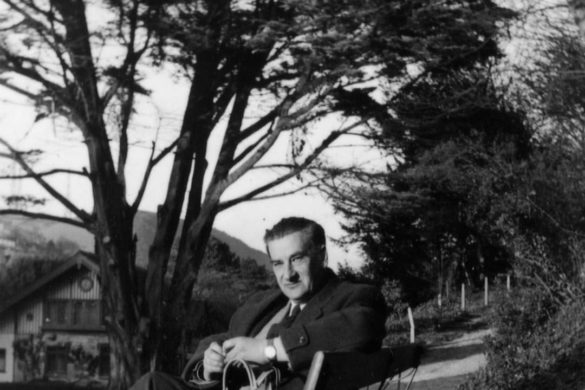
Anti-communism of Mackiewicz
Józef Mackiewicz, when asked about his nationality, replied: anti-communist. All his attitude, work and worldview were anti-communist.
He spent his childhood in tsarist Russia, so he knew very well what tsarist Russia was – although it relied on an oppressive system, it was tolerant and liberal towards the conquered nations, and above all it was law-abiding. On the other hand, during the Polish-Bolshevik war, the writer got to know a different Russia, the Bolshevik one, which was a complete contradiction of the old system of Russia – politically, systematically, philosophically and even mentally.
The early journalism of J. Mackiewicz was devoted to the analysis of the communist system. The writer emphasized that there was no fixed point of reference in the actions of the communists that could be considered the basis of their policy. Their politics is not about following common agreements or rules, but about treating any action that is convenient at the moment, with the ultimate goal of maintaining power and destroying all that is non-Bolshevik. “The cynicism of Bolshevik tactics consists in the fact that, not recognizing any religion and persecuting it mercilessly within the borders of the SSRR, it also uses the authority of that religion for the purposes of its politics”.
Mackiewicz emphasized that no statements by the communists could be believed. The writer believed that the official declarations and the law of the communists were fictitious, and the Soviet language, whose sole purpose was to mask the crimes, was of little credibility.
According to Mackiewicz, communism was a great threat to the entire civilization, because, as he explained, it is a system that first destroyed Russia and then turned against other countries, with the aim of radically destroying the concept of humanity and destroying all human achievements. Communism was a threat not only to the entire civilization, but also to man as an individual. In the early 1930s, writing about the Soviet concentration camps (Historia łagru na Sołówkach), he warned that human life does not count in Bolshevism, that in this system there are no individuals, no civil or individual rights, no property.
The enemy known during the war – communism – became the enemy with whom he fought all his life. He put the fight against it in the first place: “We should fight communism to the death. (…) This is a fight for the noblest ideals of mankind. (…)”. Mackiewicz expressed his views in the article entitled ‘Let us take an example from the Silent House’: “Communism does not admit the rights, dignity, and honor of an individual. In the Soviets, people are sentenced for crimes that, in the Christian sense, are a good deed. (…) It is an iron and consistent system for destroying our world, defeating us like weeds, without pardon and honors shown to opponents in battle. (…) One must not feel sorry for one murdered officer. The nobler this individual was, the more dangerous he was, because he was considered as an enemy of the working class. You must not show a weak heart, you must not show any respect, you must not even keep your word, because it is weakness. And communists cannot be weak. They must not only overcome, but also destroy, trample into the ground, eradicate, exterminate, murder, and shoot all their enemies! – No compromises. (…) We must destroy communism, eradicate it, launch it! No grounds, no compromise! (…) We have to apply the same iron-consistent system.”
1 Włodzimierz Bolecki, Ptasznik z Wilna. O Józefie Mackiewiczu (Zarys monograficzny), Kraków 2007, s. 116
2 „Smutna” (m.), „Słowo” 1931, nr 36; BZJ, s. 240.
3 Włodzimierz Bolecki, Ptasznik z Wilna. O Józefie Mackiewiczu (Zarys monograficzny), Kraków 2007, s. 119
4 Ibid., p. 119
5 Ibid., p. 120
Translated by Joanna Zawalska


